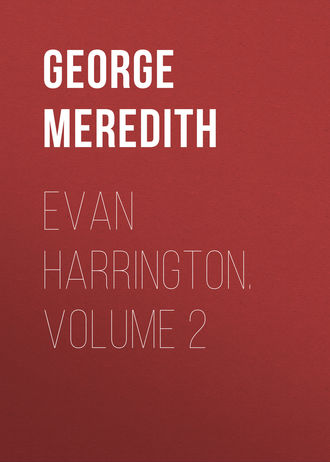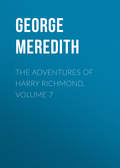
George Meredith
Evan Harrington. Volume 2
But there were reasons for Nick's rare display of skill. That woman may have the credit due to her (and, as there never was a contest of which she did not sit at the springs, so is she the source of all superhuman efforts exhibited by men), be it told that Polly Wheedle is on the field; Polly, one of the upper housemaids of Beckley Court; Polly, eagerly courted by Fred Linnington, humbly desired by Nick Frim—a pert and blooming maiden—who, while her suitors combat hotly for an undivided smile, improves her holiday by instilling similar unselfish aspirations into the breasts of others.
Between his enjoyment of society and the melancholy it engendered in his mind by reflecting on him the age and decrepitude of his hat, Mr. John Raikes was doubtful of his happiness for some time. But as his taste for happiness was sharp, he, with a great instinct amounting almost to genius in its pursuit, resolved to extinguish his suspicion by acting the perfectly happy man. To do this, it was necessary that he should have listeners: Evan was not enough, and was besides unsympathetic; he had not responded to Jack's cordial assurances of his friendship 'in spite of anything,' uttered before they came into the field.
Heat and lustre were now poured from the sky, on whose soft blue a fleet of clouds sailed heavily. Nick Frim was very wonderful, no doubt. He deserved that the Gods should recline on those gold-edged cushions above, and lean over to observe him. Nevertheless, the ladies were beginning to ask when Nick Frim would be out. The small boys alone preserved their enthusiasm for Nick. As usual, the men took a middle position. Theirs was the pleasure of critics, which, being founded on the judgement, lasts long, and is without disappointment at the close. It was sufficient that the ladies should lend the inspiration of their bonnets to this fine match. Their presence on the field is another beautiful instance of the generous yielding of the sex simply to grace our amusement, and their acute perception of the part they have to play.
Mr. Raikes was rather shy of them at first. But his acting rarely failing to deceive himself, he began to feel himself the perfectly happy man he impersonated, and where there were ladies he went, and talked of days when he had creditably handled a bat, and of a renown in the annals of Cricket cut short by mysterious calamity. The foolish fellow did not know that they care not a straw for cricketing fame. His gaiety presently forsook him as quickly as it had come. Instead of remonstrating at Evan's restlessness, it was he who now dragged Evan from spot to spot. He spoke low and nervously.
'We're watched !'
There was indeed a man lurking near and moving as they moved, with a speculative air. Writs were out against Raikes. He slipped from his friend, saying:
'Never mind me. That old amphitryon's birthday hangs on till the meridian; you understand. His table invites. He is not unlikely to enjoy my conversation. What mayn't that lead to? Seek me there.'
Evan strolled on, relieved by the voluntary departure of the weariful funny friend he would not shake off, but could not well link with.
A long success is better when seen at a distance of time, and Nick Frim was beginning to suffer from the monotony of his luck. Fallow field could do nothing with him. He no longer blocked. He lashed out at every ball, and far flew every ball that was bowled. The critics saw, in this return to his old practices, promise of Nick's approaching extinction. The ladies were growing hot and weary. The little boys gasped on the grass, but like cunning circulators of excitement, spread a report to keep it up, that Nick, on going to his wickets the previous day, had sworn an oath that he would not lay down his bat till he had scored a hundred.
So they had still matter to agitate their youthful breasts, and Nick's gradual building up of tens, and prophecies and speculations as to his chances of completing the hundred, were still vehemently confided to the field, amid a general mopping of faces.
Evan did become aware that a man was following him. The man had not the look of a dreaded official. His countenance was sun-burnt and open, and he was dressed in a countryman's holiday suit. When Evan met his eyes, they showed perplexity. Evan felt he was being examined from head to heel, but by one unaccustomed to his part, and without the courage to decide what he ought consequently to do while a doubt remained, though his inspection was verging towards a certainty in his mind.
At last, somewhat annoyed that the man should continue to dog him wherever he moved, he turned on him and asked him what he wanted?
'Be you a Muster Eav'n Harrington, Esquire?' the man drawled out in the rustic music of inquiry.
'That is my name,' said Evan.
'Ay,' returned the man, 'it's somebody lookin' like a lord, and has a small friend wi' shockin' old hat, and I see ye come out o' the Green Drag'n this mornin'—I don't reck'n there's e'er a mistaak, but I likes to make cock sure. Be you been to Poortigal, sir?'
'Yes,' answered Evan, 'I have been to Poortigal.'
'What's the name o' the capital o' Portugal, sir?' The man looked immensely shrewd, and nodding his consent at the laughing reply, added:
'And there you was born, sir? You'll excuse my boldness, but I only does what's necessary.'
Evan said he was not born there.
'No, not born there. That's good. Now, sir, did you happen to be born anywheres within smell o' salt water?'
'Yes,' answered Evan, 'I was born by the sea.'
'Not far beyond fifty mile from Fall'field here, sir?'
'Something less.'
'All right. Now I'm cock sure,' said the man. 'Now, if you'll have the kindness just to oblige me by—'he sped the words and the instrument jointly at Evan, takin' that there letter, I'll say good-bye, sir, and my work's done for the day.'
Saying which, he left Evan with the letter in his hands. Evan turned it over curiously. It was addressed to 'Evan Harrington, Esquire, T– of Lymport.'
A voice paralyzed his fingers: the clear ringing voice of a young horsewoman, accompanied by a little maid on a pony, who galloped up to the carriage upon which Squire Uplift, Sir George Lowton, Hamilton Jocelyn, and other cavaliers, were in attendance.
'Here I am at last, and Beckley's in still! How d' ye do, Lady Racial?
How d' ye do, Sir George. How d' ye do, everybody. Your servant,
Squire! We shall beat you. Harry says we shall soon be a hundred a-head
of you. Fancy those boys! they would sleep at Fallow field last night.
How I wish you had made a bet with me, Squire.'
'Well, my lass, it's not too late,' said the Squire, detaining her hand.
'Oh, but it wouldn't be fair now. And I'm not going to be kissed on the field, if you please, Squire. Here, Dorry will do instead. Dorry ! come and be kissed by the Squire.'
It was Rose, living and glowing; Rose, who was the brilliant young Amazon, smoothing the neck of a mettlesome gray cob. Evan's heart bounded up to her, but his limbs were motionless.
The Squire caught her smaller companion in his arms, and sounded a kiss upon both her cheeks; then settled her in the saddle, and she went to answer some questions of the ladies. She had the same lively eyes as Rose; quick saucy lips, red, and open for prattle. Rolls of auburn hair fell down her back, for being a child she was allowed privileges. To talk as her thoughts came, as well as to wear her hair as it grew, was a special privilege of this young person, on horseback or elsewhere.
'Now, I know what you want to ask me, Aunt Shorne. Isn't it about my Papa? He's not come, and he won't be able to come for a week.—Glad to be with Cousin Rosey? I should think I am! She's the nicest girl I ever could suppose. She isn't a bit spoiled by Portugal; only browned; and she doesn't care for that; no more do I. I rather like the sun when it doesn't freckle you. I can't bear freckles, and I don't believe in milk for them. People who have them are such a figure. Drummond Forth has them, but he's a man, and it doesn't matter for a man to have freckles. How's my uncle Mel? Oh, he's quite well. I mean he has the gout in one of his fingers, and it's swollen so, it's just like a great fat fir cone! He can't write a bit, and rests his hand on a table. He wants to have me made to write with my left hand as well as my right. As if I was ever going to have the gout in one of my fingers!'
Sir George Lowton observed to Hamilton Jocelyn, that Melville must take to his tongue now.
'I fancy he will,' said Hamilton. 'My father won't give up his nominee; so I fancy he'll try Fallow field. Of course, we go in for the agricultural interest; but there's a cantankerous old ruffian down here— a brewer, or something—he's got half the votes at his bidding. We shall see.'
'Dorothy, my dear child, are you not tired?' said Lady Racial. 'You are very hot.'
'Yes, that's because Rose would tear along the road to get here in time, after we had left those tiresome Copping people, where she had to make a call. "What a slow little beast your pony is, Dorry!"—she said that at least twenty times.'
'Oh, you naughty puss!' cried Rose. 'Wasn't it, "Rosey, Rosey, I'm sure we shall be too late, and shan't see a thing: do come along as hard as you can"?'
'I 'm sure it was not,' Miss Dorothy retorted, with the large eyes of
innocence. 'You said you wanted to see Nick Frim keeping the wicket, and
Ferdinand Laxley bowl. And, oh! you know something you said about
Drummond Forth.'
'Now, shall I tell upon you?' said Rose.
'No, don't!' hastily replied the little woman, blushing. And the cavaliers laughed out, and the ladies smiled, and Dorothy added: 'It isn't much, after all.'
'Then, come; let's have it, or I shall be jealous,' said the Squire.
'Shall I tell?' Rose asked slily.
'It 's unfair to betray one of your sex, Rose,' remarked the sweetly- smiling lady.
'Yes, Lady Racial—mayn't a woman have secrets?' Dorothy put it with great natural earnestness, and they all laughed aloud. 'But I know a secret of Rosey's,' continued Miss Dorothy, 'and if she tells upon me, I shall tell upon her.'
'They're out!' cried Rose, pointing her whip at the wickets. 'Good night to Beckley! Tom Copping 's run out.'
Questions as to how it was done passed from mouth to mouth. Questions as to whether it was fair sprang from Tom's friends, and that a doubt existed was certain: the whole field was seen converging toward the two umpires.
Farmer Broadmead for Fallow field, Master Nat Hodges for Beckley.
It really is a mercy there's some change in the game,' said Mrs. Shorne, waving her parasol. 'It 's a charming game, but it wants variety a little. When do you return, Rose?'
'Not for some time,' said Rose, primly. 'I like variety very well, but I don't seek it by running away the moment I've come.'
'No, but, my dear,' Mrs. Shorne negligently fanned her face, 'you will have to come with us, I fear, when we go. Your uncle accompanies us. I really think the Squire will, too; and Mr. Forth is no chaperon. Even you understand that.'
'Oh, I can get an old man—don't be afraid, said Rose. 'Or must I have and old woman, aunt?'
The lady raised her eyelids slowly on Rose, and thought: ' If you were soundly whipped, my little madam, what a good thing it would be for you.' And that good thing Mrs. Shorne was willing to do for Rose. She turned aside, and received the salute of and unmistakable curate on foot.
'Ah, Mr. Parsley, you lend your countenance to the game, then?'
The curate observed that sound Churchmen unanimously supported the game.
'Bravo!' cried Rose. 'How I like to hear you talk like that, Mr. Parsley. I didn't think you had so much sense. You and I will have a game together—single wicket. We must play for something—what shall it be?'
'Oh—for nothing,' the curate vacuously remarked.
'That's for love, you rogue!' exclaimed the Squire. 'Come, come, none o' that, sir—ha! ha!'
'Oh, very well; we'll play for love,' said Rose.
'And I'll hold the stakes, my dear—eh?'
'You dear old naughty Squire!—what do you mean?'
Rose laughed. But she had all the men surrounding her, and Mrs. Shorne talked of departing.
Why did not Evan bravely march away? Why, he asked himself, had he come on this cricket-field to be made thus miserable? What right had such as he to look on Rose? Consider, however, the young man's excuses. He could not possibly imagine that a damsel who rode one day to a match, would return on the following day to see it finished: or absolutely know that unseen damsel to be Rose Jocelyn. And if he waited, it was only to hear her sweet voice once again, and go for ever. As far as he could fathom his hopes, they were that Rose would not see him: but the hopes of youth are deep.
Just then a toddling small rustic stopped in front of Evan, and set up a howl for his 'fayther.' Evan lifted him high to look over people's heads, and discover his wandering parent. The urchin, when he had settled to his novel position, surveyed the field, and shouting, 'Fayther, fayther ! here I bes on top of a gentleman! made lusty signs, which attracted not his father alone. Rose sang out, 'Who can lend me a penny?' Instantly the curate and the squire had a race in their pockets. The curate was first, but Rose favoured the squire, took his money with a nod and a smile, and rode at the little lad, to whom she was saying: 'Here, bonny boy, this will buy you—'
She stopped and coloured.
'Evan!'
The child descended rapidly to the ground.
A bow and a few murmured words replied to her.
'Isn't this just like you, my dear Evan? Shouldn't I know that whenever
I met you, you would be doing something kind? How did you come here?
You were on your way to Beckley!'
'To London,' said Evan.
'To London! and not coming over to see me—us?'
Here the little fellow's father intervened to claim his offspring, and thank the lady and the gentleman: and, with his penny firmly grasped, he who had brought the lady and the gentleman together, was borne off a wealthy human creature.
Before much further could be said between them, the Countess de Saldar drove up.
'My dearest Rose!' and 'My dear Countess!' and 'Not Louisa, then?' and, 'I am very glad to see you!' without attempting the endearing ' Louisa'– passed.
The Countess de Saldar then admitted the presence of her brother.
'Think !' said Rose. 'He talks of going on straight from here to
London.'
'That pretty pout will alone suffice to make him deviate, then,' said the Countess, with her sweetest open slyness. 'I am now on the point of accepting your most kind invitation. Our foreign habits allow us to visit thus early! He will come with me.'
Evan tried to look firm, and speak as he was trying to look. Rose fell to entreaty, and from entreaty rose to command; and in both was utterly fascinating to the poor youth. Luxuriously—while he hesitated and dwelt on this and that faint objection—his spirit drank the delicious changes of her face. To have her face before him but one day seemed so rich a boon to deny himself, that he was beginning to wonder at his constancy in refusal; and now that she spoke to him so pressingly, devoting her guileless eyes to him alone, he forgot a certain envious feeling that had possessed him while she was rattling among the other males—a doubt whether she ever cast a thought on Mr. Evan Harrington.
'Yes; he will come,' cried Rose; 'and he shall ride home with me and my friend Drummond; and he shall have my groom's horse, if he doesn't mind. Bob can ride home in the cart with Polly, my maid; and he'll like that, because Polly's always good fun—when they're not in love with her. Then, of course, she torments them.'
'Naturally,' said the Countess.
Mr. Evan Harrington's final objection, based on his not having clothes, and so forth, was met by his foreseeing sister.
'I have your portmanteau packed, in with me, my dear brother; Conning has her feet on it. I divined that I should overtake you.'
Evan felt he was in the toils. After a struggle or two he yielded; and, having yielded, did it with grace. In a moment, and with a power of self-compression equal to that of the adept Countess, he threw off his moodiness as easily as if it had been his Spanish mantle, and assumed a gaiety that made the Countess's eyes beam rapturously upon him, and was pleasing to Rose, apart from the lead in admiration the Countess had given her—not for the first time. We mortals, the best of us, may be silly sheep in our likes and dislikes: where there is no premeditated or instinctive antagonism, we can be led into warm acknowledgement of merits we have not sounded. This the Countess de Saldar knew right well.
Rose now intimated her wish to perform the ceremony of introduction between her aunt and uncle present, and the visitors to Beckley Court. The Countess smiled, and in the few paces that separated the two groups, whispered to her brother: 'Miss Jocelyn, my dear.'
The eye-glasses of the Beckley group were dropped with one accord. The ceremony was gone through. The softly-shadowed differences of a grand manner addressed to ladies, and to males, were exquisitely accomplished by the Countess de Saldar.
'Harrington? Harrington?' her quick ear caught on the mouth of Squire
Uplift, scanning Evan.
Her accent was very foreign, as she said aloud: 'We are entirely strangers to your game—your creecket. My brother and myself are scarcely English. Nothing save diplomacy are we adepts in!'
'You must be excessively dangerous, madam,' said Sir George, hat in air.
'Even in that, I fear, we are babes and sucklings, and might take many a lesson from you. Will you instruct me in your creecket? What are they doing now? It seems very unintelligible—indistinct—is it not?'
Inasmuch as Farmer Broadmead and Master Nat Hodges were surrounded by a clamorous mob, shouting both sides of the case, as if the loudest and longest-winded were sure to wrest a favourable judgement from those two infallible authorities on the laws of cricket, the noble game was certainly in a state of indistinctness.
The squire came forward to explain, piteously entreated not to expect too much from a woman's inapprehensive wits, which he plainly promised (under eyes that had melted harder men) he would not. His forbearance and bucolic gallantry were needed, for he had the Countess's radiant full visage alone. Her senses were dancing in her right ear, which had heard the name of Lady Racial pronounced, and a voice respond to it from the carriage.
Into what a pit had she suddenly plunged! You ask why she did not drive away as fast as the horses would carry her, and fly the veiled head of Demogorgon obscuring valley and hill and the shining firmament, and threatening to glare destruction on her? You do not know an intriguer. She relinquishes the joys of life for the joys of intrigue. This is her element. The Countess did feel that the heavens were hard on her. She resolved none the less to fight her way to her object; for where so much had conspired to favour her—the decease of the generous Sir Abraham Harrington, of Torquay, and the invitation to Beckley Court—could she believe the heavens in league against her? Did she not nightly pray to them, in all humbleness of body, for the safe issue of her cherished schemes? And in this, how unlike she was to the rest of mankind! She thought so; she relied on her devout observances; they gave her sweet confidence, and the sense of being specially shielded even when specially menaced. Moreover, tell a woman to put back, when she is once clearly launched! Timid as she may be, her light bark bounds to meet the tempest. I speak of women who do launch: they are not numerous, but, to the wise, the minorities are the representatives.
'Indeed, it is an intricate game!' said the Countess, at the conclusion of the squire's explanation, and leaned over to Mrs. Shorne to ask her if she thoroughly understood it.
'Yes, I suppose I do,' was the reply; 'it—rather than the amusement they find in it.' This lady had recovered Mr. Parsley from Rose, but had only succeeded in making the curate unhappy, without satisfying herself.
The Countess gave her the shrug of secret sympathy.
'We must not say so,' she observed aloud—most artlessly, and fixed the squire with a bewitching smile, under which her heart beat thickly. As her eyes travelled from Mrs. Shorne to the squire, she had marked Lady Racial looking singularly at Evan, who was mounting the horse of Bob the groom.
'Fine young fellow, that,' said the squire to Lady Racial, as Evan rode off with Rose.
'An extremely handsome, well-bred young man,' she answered. Her eyes met the Countess's, and the Countess, after resting on their surface with an ephemeral pause, murmured: 'I must not praise my brother,' and smiled a smile which was meant to mean: 'I think with you, and thank you, and love you for admiring him.'
Had Lady Racial joined the smile and spoken with animation afterwards, the Countess would have shuddered and had chills of dread. As it was, she was passably content. Lady Racial slightly dimpled her cheek, for courtesy's sake, and then looked gravely on the ground. This was no promise; it was even an indication (as the Countess read her), of something beyond suspicion in the lady's mind; but it was a sign of delicacy, and a sign that her feelings had been touched, from which a truce might be reckoned on, and no betrayal feared.
She heard it said that the match was for honour and glory. A match of two days' duration under a broiling sun, all for honour and glory! Was it not enough to make her despise the games of men? For something better she played. Her game was for one hundred thousand pounds, the happiness of her brother, and the concealment of a horror. To win a game like that was worth the trouble. Whether she would have continued her efforts, had she known that the name of Evan Harrington was then blazing on a shop-front in Lymport, I cannot tell. The possessor of the name was in love, and did not reflect.
Smiling adieu to the ladies, bowing to the gentlemen, and apprehending all the homage they would pour out to her condescending beauty when she had left them, the Countess's graceful hand gave the signal for Beckley.
She stopped the coachman ere the wheels had rolled off the muffling turf, to enjoy one glimpse of Evan and Rose riding together, with the little maid on her pony in the rear. How suitable they seemed! how happy! She had brought them together after many difficulties—might it not be? It was surely a thing to be hoped for!
Rose, galloping freshly, was saying to Evan: 'Why did you cut off your moustache?'
He, neck and neck with her, replied: 'You complained of it in Portugal.'
And she: 'Portugal's old times now to me—and I always love old times.
I'm sorry! And, oh, Evan! did you really do it for me?'
And really, just then, flying through the air, close to the darling of his heart, he had not the courage to spoil that delicious question, but dallying with the lie, he looked in her eyes lingeringly.
This picture the Countess contemplated. Close to her carriage two young gentlemen-cricketers were strolling, while Fallow field gained breath to decide which men to send in first to the wickets.
One of these stood suddenly on tiptoe, and pointing to the pair on horseback, cried, with the vivacity of astonishment:
'Look there! do you see that? What the deuce is little Rosey doing with the tailor-fellow?'
The Countess, though her cheeks were blanched, gazed calmly in Demogorgon's face, took a mental impression of the speaker, and again signalled for Beckley.







